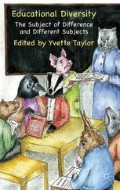Abstract
Discipline in the classroom is a perennially hot topic generating much anxiety and disapprobation. This issue has featured prominently in UK policy making in recent years and reflects a broader contemporary preoccupation with the concept of anti-social behaviour. Despite a national analysis of classroom conduct concluding that pupil behaviour remains satisfactory or better in the majority of schools (Steer, 2008), concerns are regularly stoked by high profile media stories of unruly pupils disrespecting authority, intimidating teachers and undermining the potential for willing students to learn. Anxiety over this perceived decline in classroom standards has been met with a range of high profile interventions from central government designed to strengthen the exercise of discipline in schools, giving teachers greater power to search, detain, physically restrain and exclude challenging pupils (Department for Education (DfE), 2010). Such measures also resonate with parallel concerns to raise academic standards, which have played out through an emphasis on attainment scores, exam results and school league tables.
Access this chapter
Tax calculation will be finalised at checkout
Purchases are for personal use only
Preview
Unable to display preview. Download preview PDF.
References
Burman, E. (2009) Beyond emotional literacy in feminist and educational research. British Educational Research Journal, 35(1): 137–155.
Clark, C., Dyson, A., Millward, A. and Robson, S. (1999) Theories of inclusion, theories of schools: Deconstructing and reconstructing the ‘inclusive school’. British Educational Research Journal, 25(2): 157–177.
Department for Education (DfE). (2010) The Importance of Teaching. The Education White Paper. London: HMSO.
Department for Education and Skills (DfES). (2005) Excellence and Enjoyment: Social and Emotional Aspects of Learning: Guidance. London: HMSO.
Fuller, M. (1980) Black girls in a London comprehensive school. In R. Deem (Ed.), Schooling for Women’s Work (pp. 52–56). London: Routledge.
Gillborn, D. (2008) Racism and Education Coincidence or Conspiracy? Abingdon: Routledge.
Gillborn, D. and Mirzra, H. (2000) Educational Inequality: Mapping Race, Class and Gender. A Synthesis of Research Evidence. London: Ofsted.
Gillies, V. (2007) Marginalised Mothers: Exploring Working Class Parenting. London: Routledge.
Gillies, V. (2008) Childrearing, class and the new politics of parenting. Sociology Compass, 2/3: 1079–1095.
Gillies, V. (2011) Social and emotional pedagogies: Critiquing the new orthodoxy of emotion in classroom behaviour management. British Journal of Sociology of Education, 32(2): 185–202.
Gillies, V. and Robinson, Y. (2010a) Managing emotions in research with challenging pupils. Ethnography and Education, 5(1): 97–110.
Gillies, V. and Robinson, Y. (2010b) Shifting the goalposts: Researching pupils at risk of school exclusion. In M. Rob and R. Thomson (Eds), Critical Practice with Children and Young People (pp. 281–295). Bristol: Policy Press.
Gillies, V. and Robinson, Y. (2010c) Including and excluding: Exploring gendered and racialised constructions of risk and vulnerability in the classroom. Race Equality Teaching, 29(1): 9–13.
Gillies, V. and Robinson, Y. (2012) ‘Including’ while excluding: Race, class and behaviour support units. Race, Ethnicity and Education, 15(2): 157–174
Goleman, D. (1997) Emotional Intelligence: Why It Can Matter More than IQ. New York: Bantum.
Goleman, D. (1999) Workingwith Emotional Intelligence. London: Bloomsbury.
Goleman, D. (2006) Emotional intelligence: What does the research really indicate. Educational Psychologist, 41(4): 239–245.
Mellor, J. and Epstein, D. (2006) Appropriate behaviour? Sexualities, schooling and hetero-gender. In C. Skelton, B. Francis and L. Smulyan (Eds), Sage Handbook of Gender & Education (pp. 378–392). London: Sage.
Osler, A. (2006) Excluded girls: Interpersonal, institutional and structural violence in schooling. Gender and Education, 18(6): 571–589.
Osler, A., Street, C., Lall, M. and Vincent, K. (2002) Reasons for Exclusion from School. London: Department for Education and Employment.
Osler, A. and Vincent, K. (2003) Girls and Exclusion: Rethinking the Agenda. London: Routledge.
Parsons, C. (1999) Education, Exclusion and Citizenship. London: Routledge.
Reynolds, G. (2008) The Impacts and Experiences of Migrant Children in UK Secondary Schools. Working Paper No. 47, Sussex Centre for Migration Research, University of Sussex.
Reynolds, T. (2005) Caribbean Mothers: Identity and Experience in the U.K. London: Tufnell Press.
Reynolds, T. (2009) Exploring the absent/present dilemma: Black fathers, family relationships, and social capital in Britain. American Annals, 624(1): 12–28.
Reynolds, T. (2010) Single Mothers Not the Cause of Black Boys’ Underachievement. Runnymeade Trust eConference. http://www.runnymedetrust.org/events-conferences/econferences/econference/alias-3.html [accessed 20 July 2010].
Steer, A. (2008) Learning Behaviour. The Report of the Practitioners Group on School Behaviour and Discipline. London: Department for Education and Skills.
Taylor, Y. (2007) Brushed behind the bike shed: Working class lesbians’ experiences of school. British Journal of Sociology of Education, 28(3): 349–362.
Vlachou, A. (2004) Education and inclusive policy-making: Implications for research and practice. International Journal of Inclusive Education, 8(1): 3–21.
Wright, C. (1987) The relations between teaches and Afro-Caribbean pupils: Observing multiracial classrooms. In G. Weiner and M. Arno (Eds), Gender under Scrutiny (pp. 173–186). London: Hutchinson.
Youdell, D. (2003) Identity traps or how black students fail: The interactions between biographical, sub-culture and learner identities. British Journal of Sociology of Education, 24(1): 3–20.
Copyright information
© 2012 Val Gillies
About this chapter
Cite this chapter
Gillies, V. (2012). ‘Inclusion’ Through Exclusion: A Critical Account of New Behaviour Management Practices in Schools. In: Educational Diversity. Palgrave Macmillan, London. https://doi.org/10.1057/9781137271129_2
Download citation
DOI: https://doi.org/10.1057/9781137271129_2
Publisher Name: Palgrave Macmillan, London
Print ISBN: 978-1-349-33287-8
Online ISBN: 978-1-137-27112-9
eBook Packages: Palgrave Social Sciences CollectionSocial Sciences (R0)

